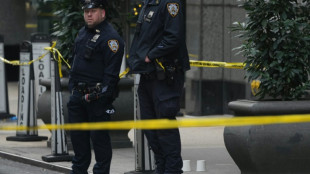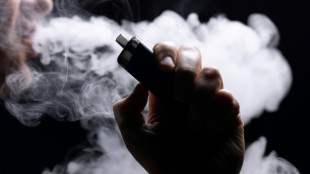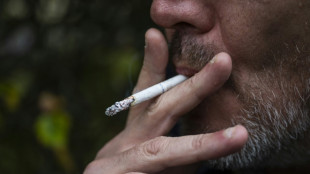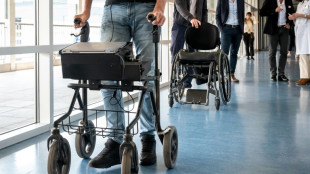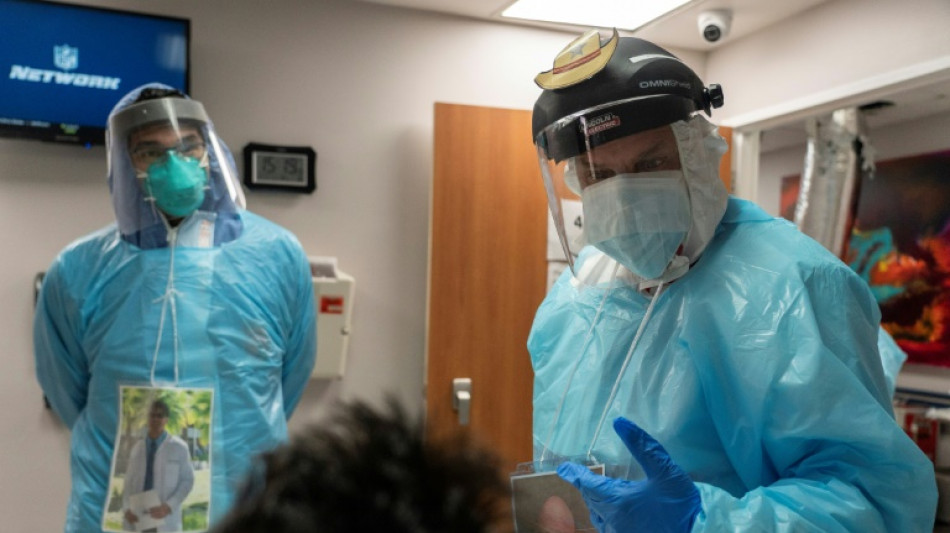
-
 South Korea president clings to power after martial law U-turn
South Korea president clings to power after martial law U-turn
-
Presidential vote seen as referendum on Romania's European future

-
 Hamilton bids farewell to Mercedes as Ferrari vie for title
Hamilton bids farewell to Mercedes as Ferrari vie for title
-
New Zealand unchanged in bid to hit back against England

-
 Macron seeks remedy to France's political crisis
Macron seeks remedy to France's political crisis
-
New Natalia Lafourcade album celebrates music's onstage evolutions
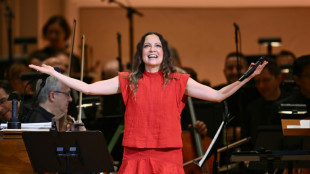
-
 Taiwan's Lai kicks off visit to US territory Guam
Taiwan's Lai kicks off visit to US territory Guam
-
Ivory Coast staple cassava meal gains UNESCO heritage status
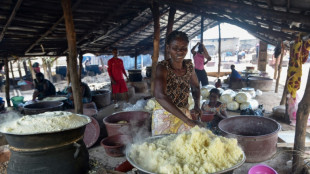
-
 OpenAI to partner with military defense tech company
OpenAI to partner with military defense tech company
-
Liverpool held but Slot salutes 'special' Salah

-
 Man City needed to break losing 'routine', says Guardiola
Man City needed to break losing 'routine', says Guardiola
-
Leipzig down Frankfurt to reach German Cup quarters, Cologne strike late

-
 Mbappe admits penalty miss 'big mistake' as Bilbao beat Real Madrid
Mbappe admits penalty miss 'big mistake' as Bilbao beat Real Madrid
-
'Sad, disappointed' Mbappe pays penalty as Bilbao beat Real Madrid

-
 US stocks surge to records, shrugging off upheaval in South Korea, France
US stocks surge to records, shrugging off upheaval in South Korea, France
-
Liverpool held in Newcastle thriller, Arsenal inflict Amorim's first defeat

-
 Shiffrin confirms she'll miss Beaver Creek World Cup races
Shiffrin confirms she'll miss Beaver Creek World Cup races
-
Corner kings Arsenal beat Man Utd to close gap on Liverpool

-
 Mbappe pays penalty as Bilbao beat Real Madrid
Mbappe pays penalty as Bilbao beat Real Madrid
-
NFL Jaguars place Lawrence on injured reserve with concussion

-
 North Korea, Russia defence treaty comes into force
North Korea, Russia defence treaty comes into force
-
Openda hits brace as Leipzig beat Frankfurt in German Cup last 16

-
 Schar punishes Kelleher blunder as Newcastle hold Liverpool in thriller
Schar punishes Kelleher blunder as Newcastle hold Liverpool in thriller
-
De Bruyne masterclass helps Man City end seven-game winless streak

-
 Syrian rebels surround Hama 'from three sides', monitor says
Syrian rebels surround Hama 'from three sides', monitor says
-
Lawyers seek leniency for France rape trial defendants, blaming 'wolf' husband

-
 OpenAI chief 'believes' Musk will not abuse government power
OpenAI chief 'believes' Musk will not abuse government power
-
Thousands rally in Georgia after police raid opposition offices

-
 S. Korea opposition push to impeach president
S. Korea opposition push to impeach president
-
Powell 'not concerned' US Fed would lose independence under Trump

-
 French government falls in historic no-confidence vote
French government falls in historic no-confidence vote
-
Syrian White Helmets chief 'dreams' of never pulling a body out of rubble again

-
 NBA Suns lose Durant for at least a week with ankle injury
NBA Suns lose Durant for at least a week with ankle injury
-
Warhammer maker Games Workshop enters London's top stocks index

-
 Iran Nobel winner released for three weeks, 'unconditional' freedom urged
Iran Nobel winner released for three weeks, 'unconditional' freedom urged
-
Red Cross marks record numbers of humanitarians killed in 2024

-
 Johnson's Grand Slam 'no threat', says World Athletics boss Coe
Johnson's Grand Slam 'no threat', says World Athletics boss Coe
-
Qatar's emir and UK's Starmer talk trade as state visit ends

-
 Cuba suffers third nationwide blackout in two months
Cuba suffers third nationwide blackout in two months
-
Russia, Ukraine to send top diplomats to OSCE summit in Malta

-
 Spanish royals to attend memorial service for flood victims
Spanish royals to attend memorial service for flood victims
-
LPGA, USGA new policy requires female at birth or pre-puberty change

-
 Stick to current climate change laws, US tells top UN court
Stick to current climate change laws, US tells top UN court
-
British Museum chief says Marbles deal with Greece 'some distance' away

-
 Pope Francis receives electric popemobile from Mercedes
Pope Francis receives electric popemobile from Mercedes
-
Gaza civil defence: thousands flee Israeli strikes, evacuation calls

-
 Trump names billionaire private astronaut as next NASA chief
Trump names billionaire private astronaut as next NASA chief
-
Pidcock to leave INEOS Grenadiers at end of season

-
 Seoul stocks weaken, Paris advances despite political turmoil
Seoul stocks weaken, Paris advances despite political turmoil
-
South America summit hopes to seal 'historic' trade deal with EU


US doctors reflect on exhaustion, trauma of one million Covid deaths
Joseph Varon -- who is chief of intensive care at United Memorial, a small hospital that mainly treats minority patients in Houston -- made headlines when a photo of him hugging an elderly Covid patient during Thanksgiving in 2020 went viral.
While that man went on to recover, it was those that did not make it that haunt Varon.
"As a doctor, just in the last two years I have signed more death certificates than ever," he said.
As the United States marks the grim milestone of one million Covid deaths, health care workers who have served on the frontlines continue to shoulder a heavy burden, even as the rest of society has moved on.
Many are exhausted, traumatized, and still afraid of crowded settings.
Varon remembers well his first death, that of an immigrant working in a hotel.
"He came into the hospital, and literally within a week he died, at 34 years of age without any pre-existing medical conditions," he said.
From then, until the last big wave at the start of this year, there was little respite.
Varon recalls nurses crying as they faced never-ending ICU admissions, beds in hallways, one intubation after another.
He also remembers his wife asking him to change his clothes in the garage before entering their home, after 20-hour shifts.
The Thanksgiving photograph, said Varon, "became a symbol that we doctors also have feelings."
At that moment, he didn't care about protecting himself, but wanted to give comfort to a man who didn't know if he'd make it and couldn't see his wife, since visits were not permitted.
The demands of work also extracted a personal toll. Varon feels far older than his 59 years, hasn't gone on vacation since the start of the pandemic, and was phoning in prescriptions on the day of his daughter's wedding.
He now sees "light at the end of the tunnel" and isn't seeing many Covid patients -- though he is seeing patients with post-Covid disorders including heart and lung issues.
- Stressed by crowds -
Early on, the disease was a total mystery: how it was transmitted, who was most susceptible, how to treat it.
Health workers feared bringing it home to their loved ones, or dying themselves.
That fear was heightened for Daniel Brenner, an emergency physician interviewed by AFP at the start of the pandemic, when doctors were scrambling to find the right strategies to deal with severe lung injury caused by serious cases of Covid.
Brenner's wife is also an emergency doctor -- and until the vaccine came along, they lived in dread of leaving behind their two young children, now aged five and three.
"The thought of dying because of what you do and leaving your children as orphans is terrifying," the 38-year-old said.
Now working in Indianapolis, Brenner says he's found it hard to re-adjust to crowds, despite far lower levels of Covid in the community, and hardly does things he used to take for granted, like eating inside restaurants.
"It's unfortunate because I'm trying to make sure that I don't inflict my trauma on my kids," he said, becoming emotional.
"I want to make sure that they have enriching fulfilling things in their lives, but it's really hard when I'm trying to figure out what's safe."
The vaccine was a major turning point, says Brenner, greatly reducing the risk of severe disease and lifting a weight off his shoulders.
But there are still vaccine holdouts getting sick.
"I have a mixture of sadness and frustration because it's preventable and I see people who are spreading misinformation, and doing themselves and their neighbors and their family a disservice," he said.
On a more hopeful note, Brenner makes a point of talking to all high-risk patients he sees about Covid vaccinations, and finds that the hesitant are generally amenable once he addresses their fears.
"The vast majority of my patients, after I have that conversation, ask me where to get vaccinated," he says.
Brenner directs them to a walkup clinic within the same hospital.
J.Horn--BTB

